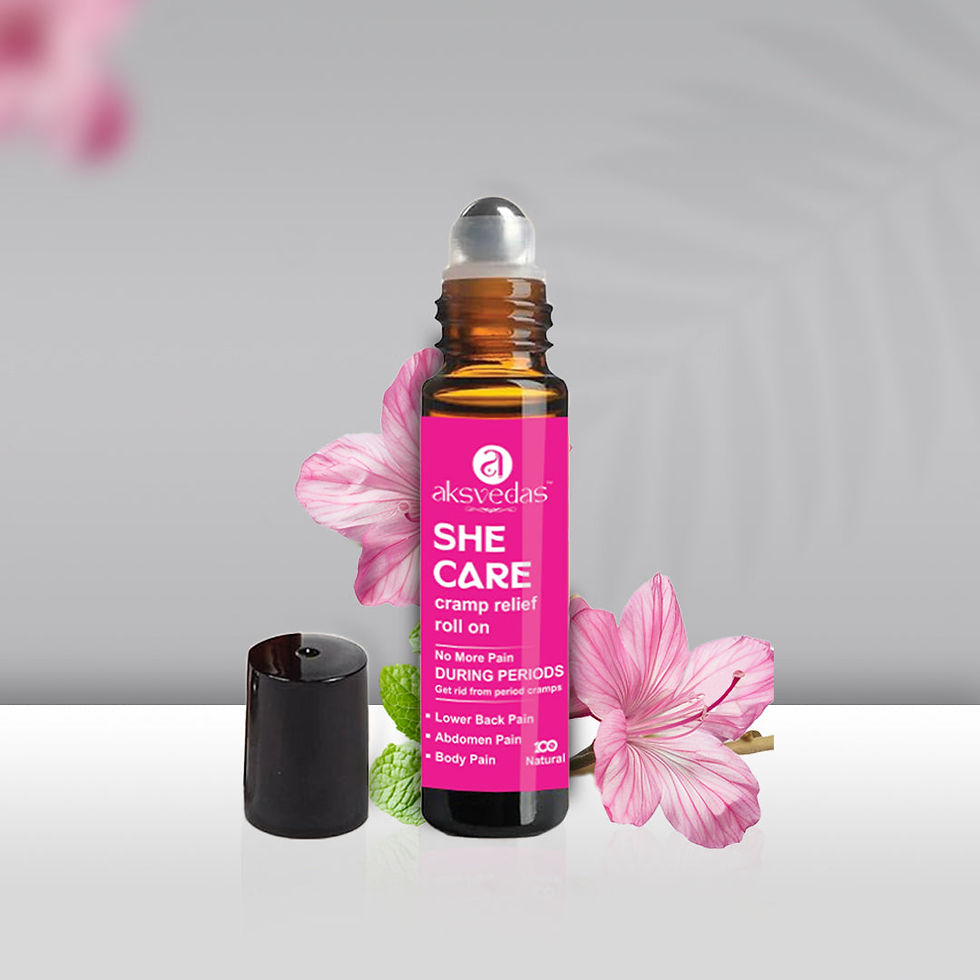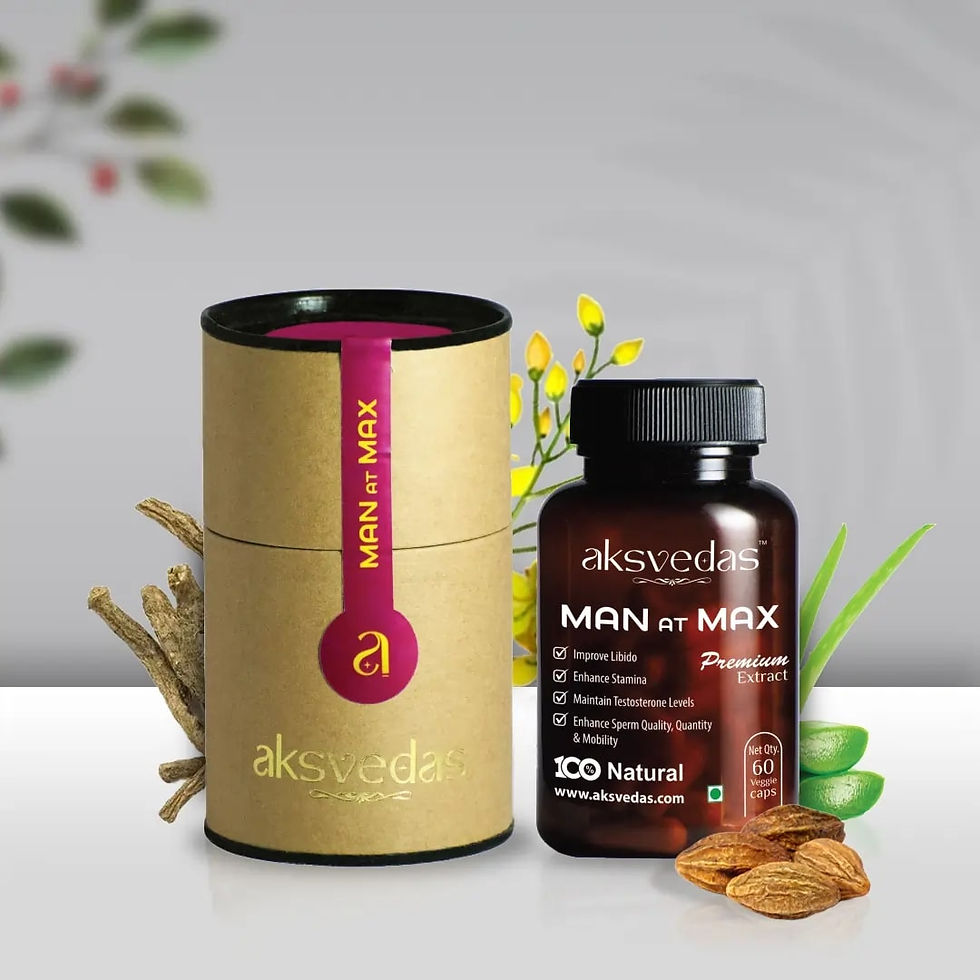The Role of Iron Supplements in Women's Health
- Aksvedas Store
- Jun 17
- 5 min read
Iron, an essential mineral, often plays an unsung but critical role in a woman's overall well-being. From regulating energy levels to supporting vital bodily functions, its importance simply cannot be overstated. While a balanced diet is always the cornerstone of good health, for many women, particularly given their unique physiological demands, iron supplements become an indispensable part of their health regimen. This comprehensive guide will delve into the profound role of iron in women's health, discuss the signs of deficiency, and explore when and why iron supplements, as a key component of women health supplements, become a necessity.

Why Iron Matters So Much for Women
Iron is fundamental to life. Its primary function is to help form hemoglobin, a protein in red blood cells that transports oxygen from the lungs to every cell in the body. Without adequate iron, oxygen delivery is compromised, leading to a cascade of health issues. Beyond oxygen transport, iron is also crucial for:
Energy Production: It’s a vital component of enzymes involved in energy metabolism.
Immune Function: A healthy immune system relies on sufficient iron to fight off infections.
Cognitive Function: Iron supports neurotransmitter synthesis and overall brain health.
Hormone Production: It plays a role in the synthesis of certain hormones.
Healthy Hair, Skin, and Nails: Adequate iron contributes to the vitality of these tissues.
Women, in particular, face unique challenges in maintaining optimal iron levels due to several physiological factors.
The Unique Iron Demands on Women
Several life stages and biological processes put women at a higher risk of iron deficiency compared to men:
Menstruation: The most significant factor. Monthly blood loss during periods can deplete iron stores, especially if bleeding is heavy or prolonged. This regular loss means women need to consistently replenish their iron intake.
Pregnancy: The demand for iron skyrockets during pregnancy. Iron is crucial for the growth and development of the fetus and placenta, as well as for increasing the mother's blood volume. Insufficient iron during pregnancy can lead to complications for both mother and baby, including preterm birth and low birth weight.
Childbirth: Significant blood loss during delivery can further deplete iron reserves, leading to postpartum anemia.
Breastfeeding: While less impactful than pregnancy, breastfeeding mothers still have increased iron needs to support milk production and their own recovery.
Growth Spurts (Adolescence): Rapid growth during teenage years, coupled with the onset of menstruation, makes adolescent girls particularly vulnerable to iron deficiency.
Dietary Habits: Vegetarians and vegans, if not careful with their meal planning, may struggle to get enough iron from plant-based sources, which are less bioavailable than animal-based iron.
Recognizing the Signs of Iron Deficiency (Anemia)
Iron deficiency, if prolonged or severe, can lead to iron-deficiency anemia, the most common nutritional deficiency worldwide, disproportionately affecting women. The symptoms can be subtle at first but worsen as the deficiency progresses. Common signs include:
Persistent Fatigue and Weakness: This is often the most noticeable symptom, as insufficient oxygen reaching tissues makes daily activities feel like a monumental effort.
Pale Skin: Reduced red blood cell count can lead to paleness, especially in the face, inside of the eyelids, and nail beds.
Shortness of Breath: Even with mild exertion, due to inadequate oxygen transport.
Dizziness or Lightheadedness: Resulting from reduced oxygen to the brain.
Headaches: Often accompanied by dizziness.
Cold Hands and Feet: Poor circulation due to low oxygen levels.
Brittle Nails: Nails may become thin, brittle, and even spoon-shaped (koilonychia) in severe cases.
Hair Loss: Iron deficiency can contribute to thinning hair or increased hair shedding.
Pica: Cravings for non-nutritive substances like ice, dirt, or clay.
Restless Legs Syndrome: An irresistible urge to move the legs, often worse at night.
Poor Concentration and Memory: Impaired cognitive function.
If you experience any of these symptoms, it's crucial to consult a healthcare professional for diagnosis through a simple blood test (complete blood count, or CBC, and ferritin levels).
The Role of Iron Supplements in Women's Health
While dietary iron (found in red meat, poultry, fish, beans, lentils, spinach, and fortified cereals) should always be prioritized, for many women, particularly those with diagnosed deficiency or increased needs, iron supplements become a necessary intervention. They are a critical component of women health supplements when dietary intake alone isn't sufficient.
When are iron supplements typically recommended?
Diagnosed Iron Deficiency Anemia: This is the most common reason. A doctor will prescribe the appropriate dosage and duration.
Heavy Menstrual Bleeding: For women experiencing significant blood loss each month, supplements can help prevent deficiency.
Pregnancy and Postpartum: Routine iron supplementation is often recommended during pregnancy to meet increased demands and prevent anemia, and sometimes post-delivery.
Strict Vegetarian or Vegan Diets: While plant-based diets can be healthy, the non-heme iron found in plants is less easily absorbed. Supplements can help bridge this gap.
Certain Medical Conditions: Conditions like celiac disease, Crohn's disease, or gastric bypass surgery can impair iron absorption, necessitating supplementation.
Important Considerations for Iron Supplementation:
Consult a Healthcare Professional: Never self-prescribe iron supplements. Excessive iron can be toxic and lead to serious health problems, including liver damage, heart problems, and diabetes. A doctor will determine if you need them and the correct dosage.
Dosage and Form: Iron supplements come in various forms (ferrous sulfate, ferrous gluconate, ferrous fumarate) and dosages. Your doctor will recommend the most suitable option.
Absorption: Taking iron supplements with Vitamin C (e.g., orange juice) can enhance absorption. Avoid taking them with calcium supplements, antacids, or milk, as these can hinder absorption.
Side Effects: Common side effects include constipation, nausea, stomach upset, and dark stools. Your doctor can offer strategies to manage these, such as starting with a lower dose or taking it with food.
Consistency: Iron supplementation often requires consistent intake over several months to replenish iron stores.
Monitoring: Regular blood tests will be necessary to monitor your iron levels and adjust the dosage as needed.
Beyond Iron: A Holistic Approach to Women Health Supplements
While iron is paramount, it's important to remember that it's part of a larger picture of women health supplements. Many women also benefit from:
Folic Acid: Crucial for reproductive health, especially before and during pregnancy.
Vitamin D: Essential for bone health, immune function, and mood.
Calcium: Vital for bone density throughout life.
Omega-3 Fatty Acids: Support brain health, heart health, and reduce inflammation.
However, each of these, including iron, should be considered based on individual needs, dietary intake, and medical advice.
Conclusion
Iron is an indispensable mineral, playing a pivotal role in the health and vitality of women across all life stages. From ensuring robust energy levels and a strong immune system to supporting healthy pregnancies, its impact is profound.
While dietary strategies are foundational, for many, iron supplements are a crucial, doctor-guided intervention to combat deficiency and optimize well-being. By understanding the unique iron demands on women, recognizing the signs of deficiency, and approaching supplementation responsibly under professional guidance, women can empower themselves to maintain optimal iron levels and unlock a healthier, more energetic life. If you suspect an iron deficiency, or are considering adding iron to your regimen of women health supplements, the first and most important step is always to consult your doctor. Your body will thank you for it.



Comments